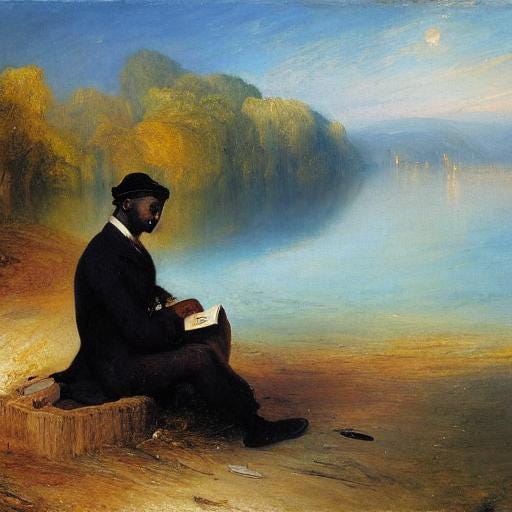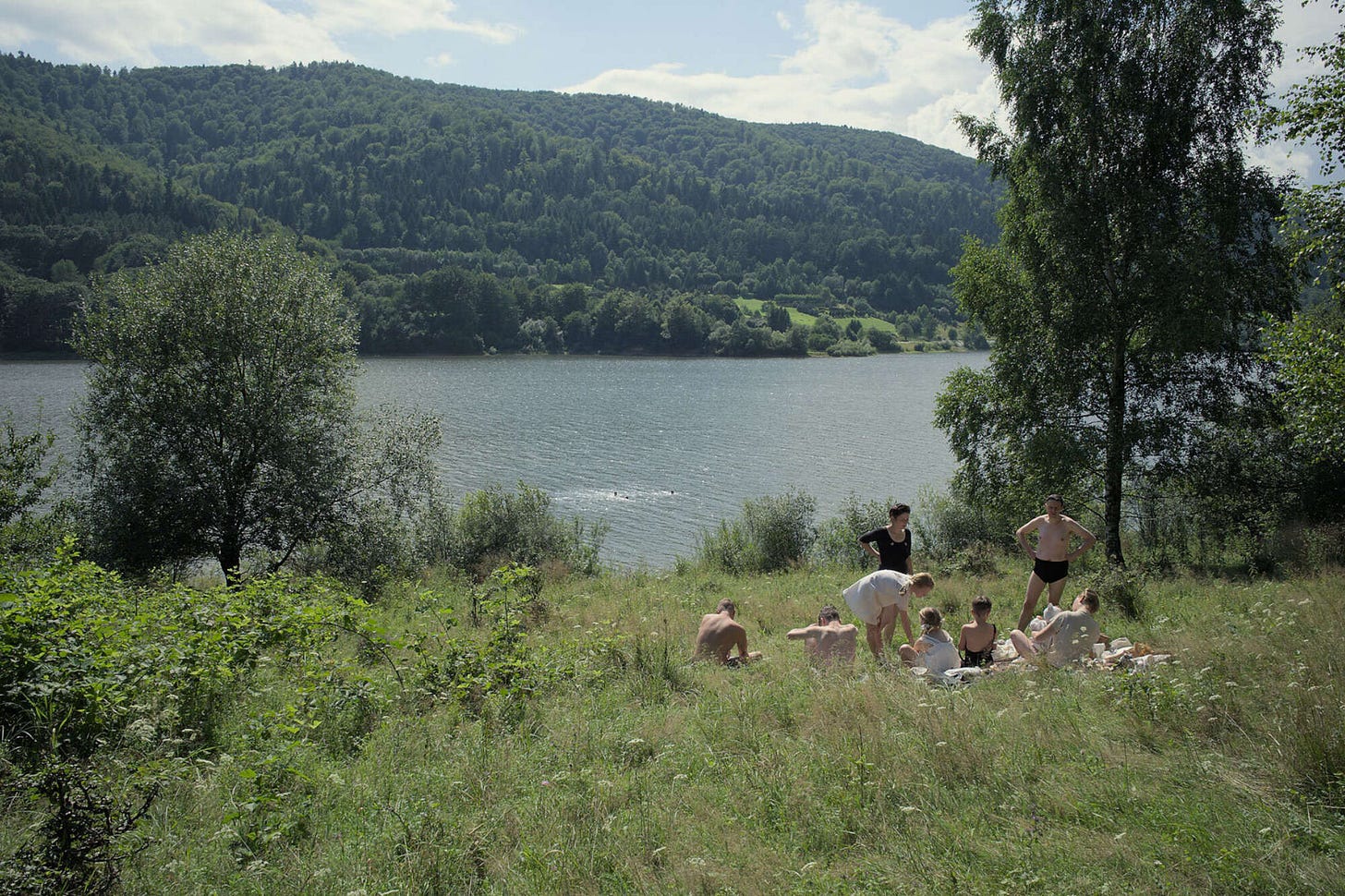Comings and Goings at the Movies, Dec. 15
The Zone of Fiction.
This weekend, two Oscar contenders begin their theatrical rollout. Although both are based on novels, and very much worth your time, they’re very, very different!
Elsewhere at the box office, I’m excited to see Timothée dance across the screen in Wonka. The best new movie I’ve seen this year, The Taste of Things, currently has a one-week awards qualifying run at the IFC Center. It gets a proper release on February 9, and I’ll run my review of it then. To whet your appetite for this delicious feast of a film, Tribeca bistro Frenchette has a special prix-fixe in honor of the movie until December 20, and of course, I nabbed a reservation.
American Fiction
Opens December 15 in New York and LA. Expands wider in the coming weeks.
Shamefully, it's been almost thirty years since Jeffrey Wright has had a true top-billed role in a movie. Fortunately, American Fiction has a character that's more than worthy of his talents. He plays a frustrated, idealistic novelist whose books don't sell because they don't conform to the publishing world's strictures for "African-American stories." There's a good reason for his perpetual crabbiness, but it also makes him kind of shitty to the people around him. In shorter words, he's a complicated, real human being, and that's not the kind of parts in which we usually get to see Jeffrey Wright. The gravitas that he brings to his exposition-heavy roles in blockbusters is converted into a weary prickliness, which helps to ground the film's more outrageous moments.
And there's a lot of such moments: this is a rather broad, often hilarious comedy. The frustrated author, Thelonius “Monk” Ellison, writes an autoracist parody of a hood novel called “My Pafology,” complete with n-words and deadbeat dads (sample text: “I been where I always be — survivin'. You ain't worth a piss. Yo' mama ain't worth a piss. So, here I am.”) In a bit of performance art, he anonymously submits the book to publishers thinking it’ll get rejected for being too ghetto. Shockingly, the novel is a smash hit. One part of American Fiction is a sendup of the capital-L Liberal cultural world, examining everyone's culpability in enforcing racial stereotypes even when we’re trying to be anti-racist. The other part is a family drama: Monk gets along well enough with his sister (Tracee Ellis Ross), but his mother (Leslie Uggams) may have Alzheimer's, and he has a strained relationship with his brother (Sterling K. Brown), a divorcee who recently came out of the closet. And he starts flirting with his neighbor, a book aficionado who’s actually read his academic-leaning books.
A lot is going on in this movie! Writer-director Cord Jefferson, adapting a novel written by Percival Everett, has the tricky task of balancing satire with drama. It's very clearly an adaptation of literary fiction, so if that type of book is not your thing, you may not love this movie. Jefferson is pretty obviously a writer first, filmmaker second, and his visual direction is quite pedestrian. But for the most part, the focus is on the writing and the acting, both of which are good enough to buoy the film. The scene to scene tonal shifts nearly reach cohesion thanks to Jeffrey Wright and a terrific ensemble that includes Issa Rae (an Oberlin grad whose wildly successful novel, "We's Lives in da Ghetto," is exactly the kind of book that Wright's character lambasts) and the always welcome Sterling K. Brown. The more realistic scenes give American Fiction a heart and soul that many satirical comedies lack. And honestly, I’ll forgive a lot of issues with a movie if it makes me laugh as hard as this one did.
There are times where I wish that Jefferson poked at things a bit harder with this adaptation: for one thing, the dynamic between Wright and Rae is woefully underexplored. Though the director envisioned this film as a "big tent" that’s easy for everyone to enter into, it may be a bit too easy, in a way that a liberal white audience can laugh at themselves without leading to any real introspection. (Then again, maybe that's the point?) But the main reason the satire seems to be a bit outdated is that the original novel is over twenty years old, and it seems like this was a fairly faithful adaptation even though society has changed a bit since then. Contrast this with Shortcomings, a new-ish movie from another first-time director that more successfully updated a twenty year old book that examines race through an unlikeable protagonist. Unlike American Fiction, the screenwriter, Adrian Tomine, was also the writer of the original graphic novel. He probably felt freer to make changes to his own story, while Jefferson felt a need to hew close to the text. There are some parts that Jefferson has updated, to match today's post-George Floyd landscape, with bits about guilty white people shoehorning diversity, equity, and inclusion wherever they can. Those are the bits that hit/hurt the most.
And for dinner…
Food is not a focal point of this movie, though there are many dinner table conversations, with one particularly tense argument unfolding over plates of spaghetti. In keeping with the stereotype that writers are always drunk, there is a lot of wine consumed throughout the movie, and there’s no problem doing the same when you watch this. And there’s a great scene with two characters, that I won’t spoil, that uses Johnnie Walker Red, Black, and Blue as an analogy. When they toast, they’re drinking the cheaper Red.
The Zone of Interest
Opens December 15 in New York and LA. Expands wider in the coming weeks.
Pushing the limits of mainstream narrative filmmaking, The Zone of Interest is at once fascinating, impressive, and chilling. If you saw this movie with the sound off, it would, at first, seem to be an idyllic portrait of a German family, with mother, father, children all living in a charming house. But even these early scenes are inflected with a constant buzz of ambient terror. From the first frame, audio leads the visuals, and imbues the story with extratextual meaning. The dissonance between picture and sound quickly makes sense: the patriarch of the family is a Nazi official, and he and his family live right next to Auschwitz.
This isn’t your grandfather’s Holocaust drama. There are no acts of heroism or guilt. Director Jonathan Glazer even suggests that small acts of resistance, such as a villager leaving fruits behind for the starving prisoners, are ultimately meaningless. The bureaucracy of the killing machine, and its efficiency, is nearly unstoppable. It’s a different type of chilling when you see smokestacks in the background and realize it’s not what is being burned, but who, and how the smell must permeate every surface.
I thought that a conventional plot would eventually emerge, with drama and arcs and character development. But the film remains more of a tonal piece. The real action, for lack of a better word, is offscreen, behind the camp’s gates. Even though the camera never takes us inside the concentration camp, the knowledge of the evil happening inside is impossible to ignore. So how is it that our protagonists can seem so unaware? It’s not as if they are ignorant. Primed for terror by Mica Levi’s menacing score and Johnnie Burn’s tense sound design, we see the little ways in which this family acknowledges the Holocaust next door: a gifted fur coat with used lipstick in the pockets, the work meetings in which organized murder is discussed with mechanical terms.
Usually, period pieces such as this try to emulate the visual look of its time. A World War II picture would have a warm sepia tone and a rather muted color palette. But in this film, we’re presented with a very sharp digital image, often with wide camera shots. There’s no nostalgia for the past; in fact, the same false bliss may be with us in the present. Is it possible that today, there is a raging fire whose smoke we refuse to smell?
And for dinner…
Sumptuous feasts will delight the eyes throughout much of The Zone of Interest… just kidding! There are no cute food or drink pairings with this one. Maybe a stiff drink afterwards. You’ll need it.





